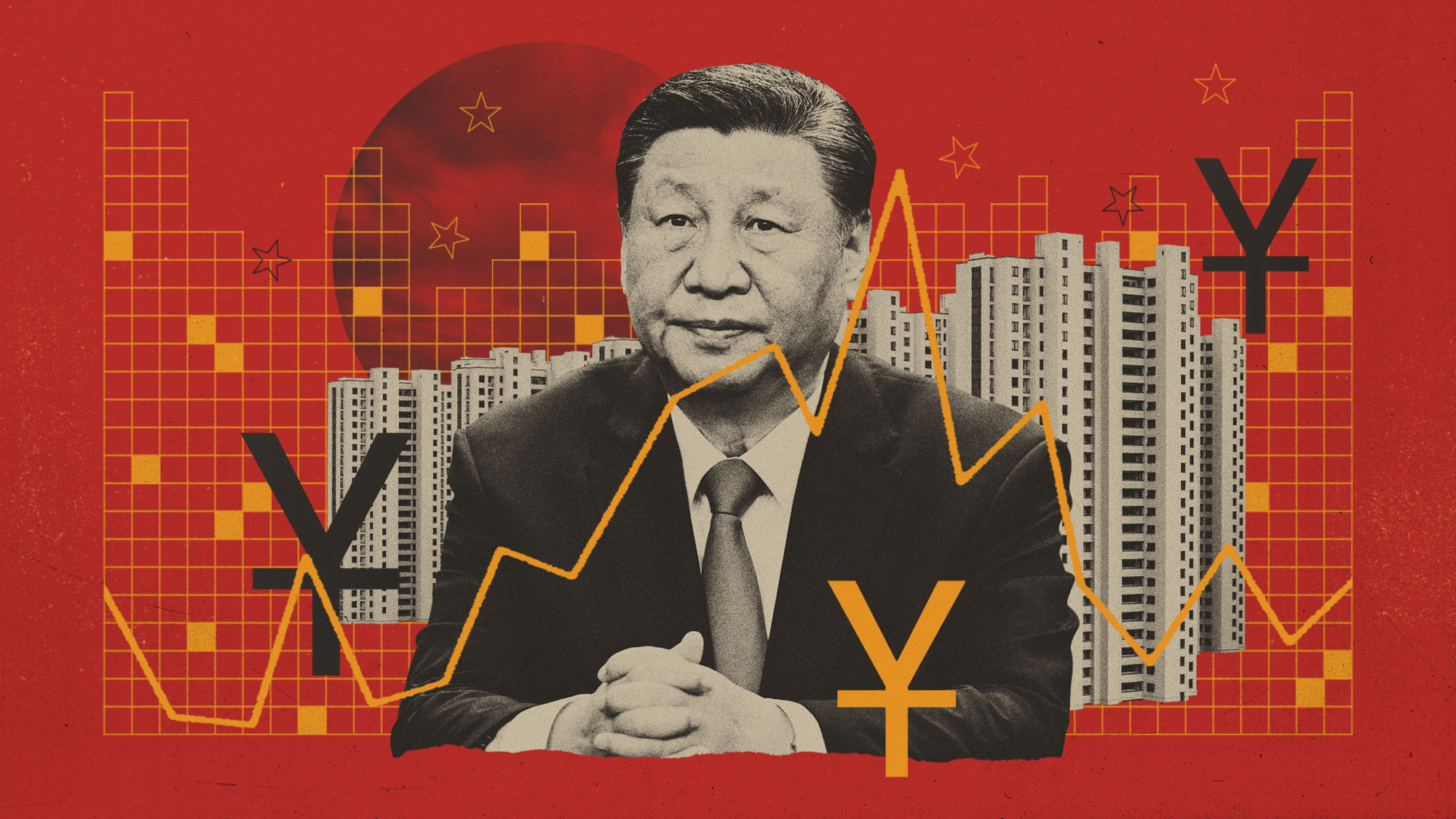Why can't China turn its economy around?
The post-pandemic crisis puts pressure on Communist Party leaders


A free daily email with the biggest news stories of the day – and the best features from TheWeek.com
You are now subscribed
Your newsletter sign-up was successful
China's economy is stumbling, again. Slower-than-expected second-quarter growth statistics are putting "further pressure on the Communist Party" as its leaders gathered this week to plan the way forward, said The New York Times. Those leaders have tried to offset the country's longstanding real estate slump with a boost to export-driven manufacturing, but that has led to a "glut of goods, from chemicals to cars" and a backlash — in the form of tariffs — from countries whose leaders "fear the flood of Chinese goods will overwhelm local industries." The result? China is "limping along precariously," said one analyst.
"Since late 2022, China's policymakers have introduced a slew of measures to try to revive the market," said The Wall Street Journal. It's not working. And "expectations are low" that this week's meeting — known as the "Third Plenum" — will offer a "significant course correction" to start truly turning the Chinese economy around. Instead, it's expected that President Xi Jinping will double down on his manufacturing-centric export strategy while neglecting efforts to boost spending by Chinese consumers at home. Economists are skeptical that would produce anything but a new round of trade wars. "The Chinese economy is foundering," said Cornell University's Eswar Prasad.
What did the commentators say?
The Third Plenum is intended to be about "long-term reform not short-term stimulus," said The Economist. In fact, the two aren't so easy to distinguish. One long-term problem: Consumer spending is "chronically weak in China." That's partly due to a "thin social safety net" that forces China's poorest households to scrimp and save instead of spend. Communist leaders could help goose that spending with a series of reforms, including "fatter state pensions and improved health care." To fix the economy now, though, any long-term reform must be accompanied "with further stimulus spending in the short term."
The Week
Escape your echo chamber. Get the facts behind the news, plus analysis from multiple perspectives.

Sign up for The Week's Free Newsletters
From our morning news briefing to a weekly Good News Newsletter, get the best of The Week delivered directly to your inbox.
From our morning news briefing to a weekly Good News Newsletter, get the best of The Week delivered directly to your inbox.
"China must recognize that its fundamental recipe for success has not changed," the University of Hong Kong's Brian Y. S. Wong said in The South China Morning Post. In the post-Mao era, China exploded from a poor nation into the world's second-largest economy by opening its doors to the world. A burgeoning "Cold War II" between China and the West has recently shifted the focus to "intense strategic rivalries." The best thing to do now is make China newly welcoming to foreigners, "whether they are tourists, students or skilled labor." That open-door policy will be one of the "integral elements" of China's future economic success.
What next?
The low expectations were correct. Chinese leaders pledged to "better manage" the country's economy on Thursday, said Nikkei Asia. But there were "no clear bombshells and few details" about the plans or reforms going forward. "There's nothing hinting at China heading towards a different policy direction," said one analyst. What clues that emerged didn't hint at a new opening to the world, said The Associated Press. Instead, the Third Plenum issued a statement saying "national security is an important foundation for the steady and long-term development of Chinese-style modernization.”
The idea that China might overtake the U.S. as the world's largest economy "has been a fixation for policymakers and economists for decades," said Deutsche Welle. Now there's a new question: "Has China's economy peaked?" The country is burdened with a "heavy debt load, slowing productivity, low consumption and an aging population" and faces increasing tensions with the West. There's a possibility that "China's impending economic supremacy may be delayed, or never happen."
A free daily email with the biggest news stories of the day – and the best features from TheWeek.com
Joel Mathis is a writer with 30 years of newspaper and online journalism experience. His work also regularly appears in National Geographic and The Kansas City Star. His awards include best online commentary at the Online News Association and (twice) at the City and Regional Magazine Association.
-
 The Week contest: AI bellyaching
The Week contest: AI bellyachingPuzzles and Quizzes
-
 Political cartoons for February 18
Political cartoons for February 18Cartoons Wednesday’s political cartoons include the DOW, human replacement, and more
-
 The best music tours to book in 2026
The best music tours to book in 2026The Week Recommends Must-see live shows to catch this year from Lily Allen to Florence + The Machine
-
 Is the US in a hiring recession?
Is the US in a hiring recession?Today's Big Question The economy is growing. Job openings are not.
-
 Will Trump’s 10% credit card rate limit actually help consumers?
Will Trump’s 10% credit card rate limit actually help consumers?Today's Big Question Banks say they would pull back on credit
-
 What will the US economy look like in 2026?
What will the US economy look like in 2026?Today’s Big Question Wall Street is bullish, but uncertain
-
 TikTok secures deal to remain in US
TikTok secures deal to remain in USSpeed Read ByteDance will form a US version of the popular video-sharing platform
-
 How will China’s $1 trillion trade surplus change the world economy?
How will China’s $1 trillion trade surplus change the world economy?Today’s Big Question Europe may impose its own tariffs
-
 Who will be the next Fed chair?
Who will be the next Fed chair?Today's Big Question Kevin Hassett appears to be Trump’s pick
-
 Shein in Paris: has the fashion capital surrendered its soul?
Shein in Paris: has the fashion capital surrendered its soul?Talking Point Despite France’s ‘virtuous rhetoric’, the nation is ‘renting out its soul to Chinese algorithms’
-
 Would a 50-year mortgage make home ownership attainable?
Would a 50-year mortgage make home ownership attainable?Today's Big Question Trump critics say the proposal is bad policy
